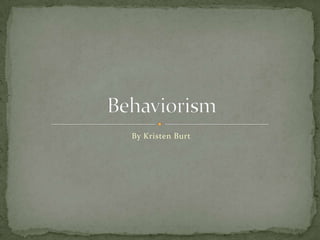Learning Theory - Behaviorism
•Download as PPTX, PDF•
7 likes•933 views
Learning Theory -- Behaviorism
Report
Share
Report
Share

Recommended
More Related Content
What's hot
What's hot (20)
Viewers also liked
Viewers also liked (20)
Itd 546 assgnmt 3 sisson - behaviorism for slideshare

Itd 546 assgnmt 3 sisson - behaviorism for slideshare
Behaviorism - behavioral theory of learning Suhair ababneh & Amani Alomari 

Behaviorism - behavioral theory of learning Suhair ababneh & Amani Alomari
The role of the teacher using the behaviorism theory

The role of the teacher using the behaviorism theory
Similar to Learning Theory - Behaviorism
Presented at LILAC 2016Lowering students' anxiety during information skills training with active lea...

Lowering students' anxiety during information skills training with active lea...IL Group (CILIP Information Literacy Group)
Similar to Learning Theory - Behaviorism (20)
Lowering students' anxiety during information skills training with active lea...

Lowering students' anxiety during information skills training with active lea...
Teaching electronic resources to students with computer anxiety

Teaching electronic resources to students with computer anxiety
Teaching Electronic Resources to Students with Computer Anxiety

Teaching Electronic Resources to Students with Computer Anxiety
Recently uploaded
Mehran University Newsletter is a Quarterly Publication from Public Relations OfficeMehran University Newsletter Vol-X, Issue-I, 2024

Mehran University Newsletter Vol-X, Issue-I, 2024Mehran University of Engineering & Technology, Jamshoro
Recently uploaded (20)
Sensory_Experience_and_Emotional_Resonance_in_Gabriel_Okaras_The_Piano_and_Th...

Sensory_Experience_and_Emotional_Resonance_in_Gabriel_Okaras_The_Piano_and_Th...
Exploring_the_Narrative_Style_of_Amitav_Ghoshs_Gun_Island.pptx

Exploring_the_Narrative_Style_of_Amitav_Ghoshs_Gun_Island.pptx
Interdisciplinary_Insights_Data_Collection_Methods.pptx

Interdisciplinary_Insights_Data_Collection_Methods.pptx
Unit 3 Emotional Intelligence and Spiritual Intelligence.pdf

Unit 3 Emotional Intelligence and Spiritual Intelligence.pdf
Food safety_Challenges food safety laboratories_.pdf

Food safety_Challenges food safety laboratories_.pdf
Fostering Friendships - Enhancing Social Bonds in the Classroom

Fostering Friendships - Enhancing Social Bonds in the Classroom
Beyond_Borders_Understanding_Anime_and_Manga_Fandom_A_Comprehensive_Audience_...

Beyond_Borders_Understanding_Anime_and_Manga_Fandom_A_Comprehensive_Audience_...
HMCS Vancouver Pre-Deployment Brief - May 2024 (Web Version).pptx

HMCS Vancouver Pre-Deployment Brief - May 2024 (Web Version).pptx
Basic Civil Engineering first year Notes- Chapter 4 Building.pptx

Basic Civil Engineering first year Notes- Chapter 4 Building.pptx
Plant propagation: Sexual and Asexual propapagation.pptx

Plant propagation: Sexual and Asexual propapagation.pptx
General Principles of Intellectual Property: Concepts of Intellectual Proper...

General Principles of Intellectual Property: Concepts of Intellectual Proper...
Learning Theory - Behaviorism
- 2. Key Points Key People Teaching Through Behaviorism Learning Through Behaviorism My Classroom
- 3. All behaviors are acquired through conditioning Conditioning occurs through interaction with the environment There are three types of learning: Classical Conditioning Operant Conditioning Social Learning
- 4. Classic Conditioning A neutral stimulus is paired with a response You introduce the stimulus and then reinforce the reflex Eventually, response comes naturally with the stimulus
- 5. Operant Conditioning Learning through rewards and punishments It begins with a stimulus (behavior) and is reinforced with a response (reward) Eventually will stop bad response from occurring and will continue with the good
- 6. Social Learning An observed behavior that is mimicked Acquired behaviors by watching others
- 7. Interesting Fact These theories can all be used to train animals as well!!
- 8. Ivan Pavlov B. F. Skinner, Albert Bandura Edward Thorndike
- 9. Created puzzle boxes to use for instrumental conditioning Well known for his work with animals Used experimental approach to understand learning
- 10. Without Technology Ignores disruptive behavior to stop behavior Use happy faces for good behavior Assigns special privileges to those who behave Gives stickers for turning in work on time Separate student from others “time out” Take recess away if they talk out in class
- 11. With Technology Take away computer privileges Play a computer game for early project submission Type their next paper for writing neatly on the last one Have them wipe down computers for not using them properly
- 12. Without Technology Hand in assignments on time to avoid negative response Behave so they can be the “Line Leader “or “Door Monitor” Stop talking in class so they can sit with everyone Behave so they can get a happy face Hand in their project early for a reward
- 13. With Technology Turn in assignment early to get extra time on computer Use computers properly to keep computer privileges Behave in class so they can play games on computer Study so you can use the interactive white board
- 14. This theory is important to learning behaviors I think positive reinforcement is best (rewards) Consistency would be a key factor
- 15. I would use operant conditioning the most This would help me with ESOL students I can teach expectable behaviors